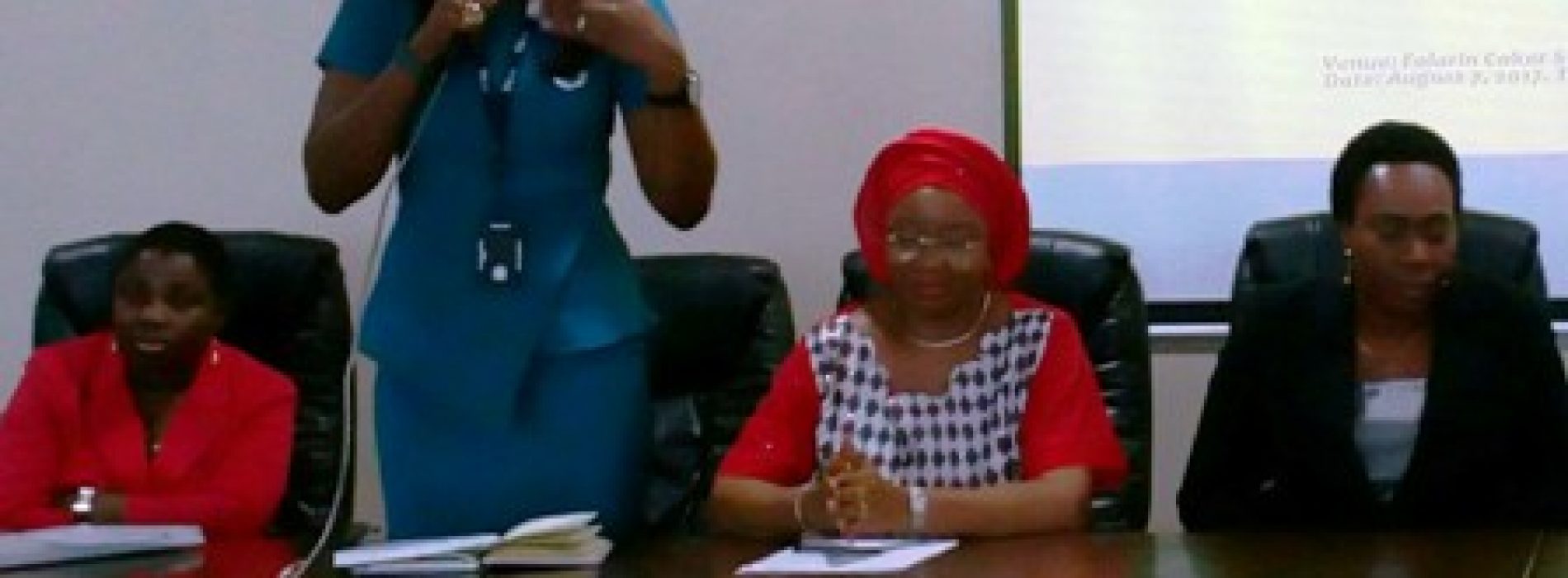TBAs, others urged to promote exclusive breastfeeding

From Left: Mrs Lara Dahunsi from the Traditional Medicine Board; Dr Uche Ralph-Opara (standing) representing A&T; Mrs. Lola Alonge, MD CHAI and Mrs. Oluwatoyin Adams, Chief Nutrition Officer, Lagos State Ministry of Health at the event.
To increase the rate of exclusive breastfeeding in Lagos, private sectors as well as traditional birth attendants, (TBAs) have been charge to encourage pregnant and lactating mothers seeking health care in their facilities to embrace breastfeeding.
This was the focus of a one-day sensitization workshop held today at Alausa secretariat, organized by Alive & Thrive (A & T) a non-governmental organization, funded by the Bill & Melinda Gates foundation and managed by FHI 360 with an initiative to save lives, prevent illness and ensure healthy growth and development in infants through improved breastfeeding and complementary feeding practices, in partnership with Lagos State government to mark the 2017 World Breastfeeding Week.
Welcoming guests to the event, the Director, Family Health & Nutrition (LSMOH) Folashade Folashayo Oludara who was represented by Dr. Eniosho Masidat said the private sectors as well TBAs have a key role to play when it comes to breastfeeding because a large chunks of mothers patronize them. According to her, it is when all the sectors come together to work as a team and pass the message of exclusive breastfeeding to one another that the breastfeeding rate in Lagos would increase.
Dr. Uche Ralph-Opara representative of A & T who spoke on behalf of A & T Project Director, Mr. Victor Ogbodo, noted the importance of the gathering saying: “Typically we will get people mostly from the public sector, but we decided to change our focus this year and talk with the private sector because whether we like it or not, majority of the pregnant women and lactating mothers come to seek care from you.
“So we would like you to walk out of this door as breastfeeding champions at the end of the day, spreading the word. Encourage women to breastfeed even when they struggle and they come back to you, encourage them to keep breast feeding and not to look for the alternative,” Dr. Ralph-Opara advised.
Taking into cognizance that today, August 7, marks the end of 2017 World Breastfeeding Week which started since August 1, she appealed that it should mark the beginning of advocacy, preaching and spreading the good news of breastfeeding.
Mrs. Lola Alonge, Managing Director/Chief Executive Officer, Child Health Advocacy Initiative, (CHAI) who also spoke at the forum noted that government cannot do it alone since breastfeeding statistics from Lagos and Nigeria at large is still very low.
“We can sustain breastfeeding together starting from the family, community, health workers and employers. For the private practitioners here today, and the TBAs, I’m really happy you are here because the government cannot do it alone. You are the ones they meet most times; that means a lot of works has to be done at your level.
“Looking at issues like water, exclusive breastfeeding especially the first 30 minutes after birth which is as if it’s an issue with private practitioners and TBAs and of course other issues like breastfeeding in public places, we need your support,” she appealed.
Mrs. Taiwo Fadairo, from Family Health & Nutrition, FH&N gave an overview and objective of the Breastfeeding Week as well as effective practices of breastfeeding and the benefits to the mother and the child. She described breastfeeding as an act which entails feeding a baby with milk directly from the mother’s breast.
“Then exclusive breastfeeding on its own is feeding a baby with breast milk only for the first six months of life without addition of water, concussion or any other thing like supplement or anything that is representing breast milk. From studies, it has shown that a baby can feed well and the baby will be sustained only on breast milk for the first six months even with multiple births. It is very possible.
“There are a lot of issues with breastfeeding to the extent that some mothers say ‘no; this baby doesn’t like breast milk.’ There is no child that does not like breast milk because it is nature’s own best meal for that child. So it is the way and manner, our practices, our action, how we carry those babies, positioning and attachment and all others that show how some children enjoy breastfeeding and the other children refuse breastfeeding,” Mrs. Fadairo said.







0 Comments
No Comments Yet!
You can be first to comment this post!